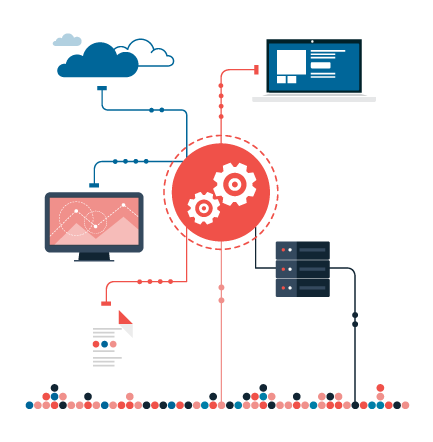Data governance defines how enterprises manage availability, usability, integrity and security of their data with a set of predefined rules and processes in place.

Data governance has never been more important. With the advent of social media, Web, big data, and cloud technologies, petabytes of data is scattered all over the place, both on-premises and off-premises. Without proper visibility and control of your organizational data, your business can not only risk revenue and productivity loss but also face existential crisis. Specifically, Industries such as financial services and pharmaceuticals are constantly under strict government scrutiny and audit to ensure that customer data is private and protected. To make the situation even more complex, geographical regions are now setting up their own data protection laws, such as GDPR or GRC. Data governance and privacy will grow exceedingly complex, unless businesses begin to take action starting now.
Setting up a well controlled data management framework and process is important for each organization across the globe, just as it is critical to establish data stewards with proper ownership over the data. But mid-to-large scale organizations face many challenges with regard to setting up a centralized, well controlled data management framework.


The Denodo Platform leverages data virtualization to offer comprehensive data and metadata discovery and management capabilities including data governance, data lineage, and change impact analysis. Data virtualization enables organizations to create central data access, data governance, and security policies across heterogeneous systems of structured and unstructured data sources. Whether some of the data sources or consuming applications are spread across geographies or divided between on-premises and cloud, the Denodo Platform seamlessly facilitates the central control of data governance and security.
Data virtualization is an agile, flexible data integration technology that can help organizations address the growing challenges in data governance, security, and compliance. Data virtualization can enable:
Integrate the fragmented data sources across internal and external systems and enforce consistent policies of data access and data security.
Data virtualization enables multinational companies to facilitate data integration and regional policy enforcement across borders, without moving or replicating any data.
For industries that depend on regulatory compliance for success, data virtualization is becoming the most critical component of their enterprise data architecture.

Lorem ipsum dolor sit amet, consectetur adipiscing elit, sed do eiusmod tempor incididunt ut labore et dolore magna aliqua. Quis ipsum suspendisse ultrices gravida.
Copyright @ b-transform.com. All Rights Reserved